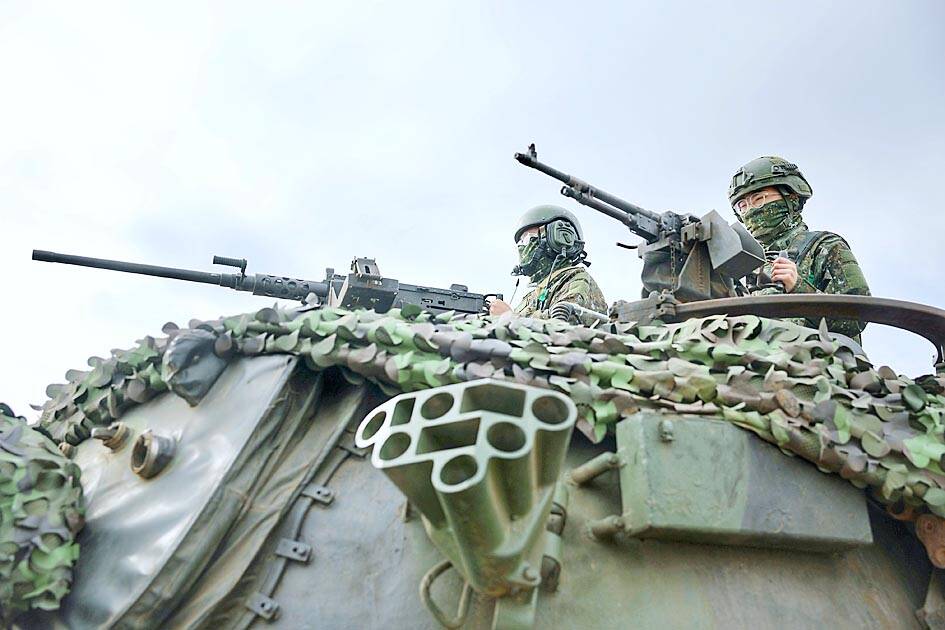There is a “moderate” likelihood of a cross-strait war this year that could have a “high” impact on US interests, a survey by the New York-based Council on Foreign Relations said on Tuesday.
“Intensified military and economic pressure by China toward Taiwan” is listed among other “top conflicts to watch in 2025” as a “Tier I (High Priority)” potential war, the think tank’s Center for Preventative Action (CPA) said in a report.
China’s hostile actions toward Taiwan could “precipitate a severe cross-strait crisis involving the United States and other countries in the region,” the report said, adding that such a scenario could “suddenly ignite.”

Photo: CNA
The report, titled “Preventive Priorities Survey 2025,” is based on 680 responses from foreign policy experts collected in November last year. It “evaluates ongoing and potential conflicts based on their likelihood of occurring in the coming year and their expected impact on US interests.”
A potential armed conflict between Taiwan and China has been listed as a “moderate likelihood” and “high impact” Tier I contingency every year since 2020 in the CPA’s annual report.
Other moderate-likelihood and high-impact conflict scenarios listed alongside a possible cross-strait war in this year’s report are cyberattacks on US critical infrastructure, “aggressive Chinese actions” in the South China Sea, and “domestic terrorism and political violence” in the US.
The highest-risk potential conflict scenarios — those listed as of high likelihood and high impact — in the survey included “a continuation of the Israel-Hamas war” and “increased conflict between Israeli security forces and Palestinians in the West Bank.”
They also include “major Russian military gains in Ukraine,” “an escalation of the conflict between Iran and Israel” and heightened “tensions with Mexico.”
A humanitarian crisis in Haiti, “accelerated state collapse” in Lebanon, and “increased Russian military provocations and influence operations in eastern Europe” are listed as high-likelihood and moderate-impact potential conflict scenarios.
The Council on Foreign Relations “generates policy-relevant ideas and analysis, convenes experts and policymakers, and promotes informed public discussion,” the report said.

A magnitude 7.0 earthquake struck off Yilan at 11:05pm yesterday, the Central Weather Administration (CWA) said. The epicenter was located at sea, about 32.3km east of Yilan County Hall, at a depth of 72.8km, CWA data showed There were no immediate reports of damage. The intensity of the quake, which gauges the actual effect of a seismic event, measured 4 in Yilan County area on Taiwan’s seven-tier intensity scale, the data showed. It measured 4 in other parts of eastern, northern and central Taiwan as well as Tainan, and 3 in Kaohsiung and Pingtung County, and 2 in Lienchiang and Penghu counties and 1

A car bomb killed a senior Russian general in southern Moscow yesterday morning, the latest high-profile army figure to be blown up in a blast that came just hours after Russian and Ukrainian delegates held separate talks in Miami on a plan to end the war. Kyiv has not commented on the incident, but Russian investigators said they were probing whether the blast was “linked” to “Ukrainian special forces.” The attack was similar to other assassinations of generals and pro-war figures that have either been claimed, or are widely believed to have been orchestrated, by Ukraine. Russian Lieutenant General Fanil Sarvarov, 56, head

FOREIGN INTERFERENCE: Beijing would likely intensify public opinion warfare in next year’s local elections to prevent Lai from getting re-elected, the ‘Yomiuri Shimbun’ said Internal documents from a Chinese artificial intelligence (AI) company indicated that China has been using the technology to intervene in foreign elections, including propaganda targeting Taiwan’s local elections next year and presidential elections in 2028, a Japanese newspaper reported yesterday. The Institute of National Security of Vanderbilt University obtained nearly 400 pages of documents from GoLaxy, a company with ties to the Chinese government, and found evidence that it had apparently deployed sophisticated, AI-driven propaganda campaigns in Hong Kong and Taiwan to shape public opinion, the Yomiuri Shimbun reported. GoLaxy provides insights, situation analysis and public opinion-shaping technology by conducting network surveillance

‘POLITICAL GAME’: DPP lawmakers said the motion would not meet the legislative threshold needed, and accused the KMT and the TPP of trivializing the Constitution The Legislative Yuan yesterday approved a motion to initiate impeachment proceedings against President William Lai (賴清德), saying he had undermined Taiwan’s constitutional order and democracy. The motion was approved 61-50 by lawmakers from the main opposition Chinese Nationalist Party (KMT) and the smaller Taiwan People’s Party (TPP), who together hold a legislative majority. Under the motion, a roll call vote for impeachment would be held on May 19 next year, after various hearings are held and Lai is given the chance to defend himself. The move came after Lai on Monday last week did not promulgate an amendment passed by the legislature that